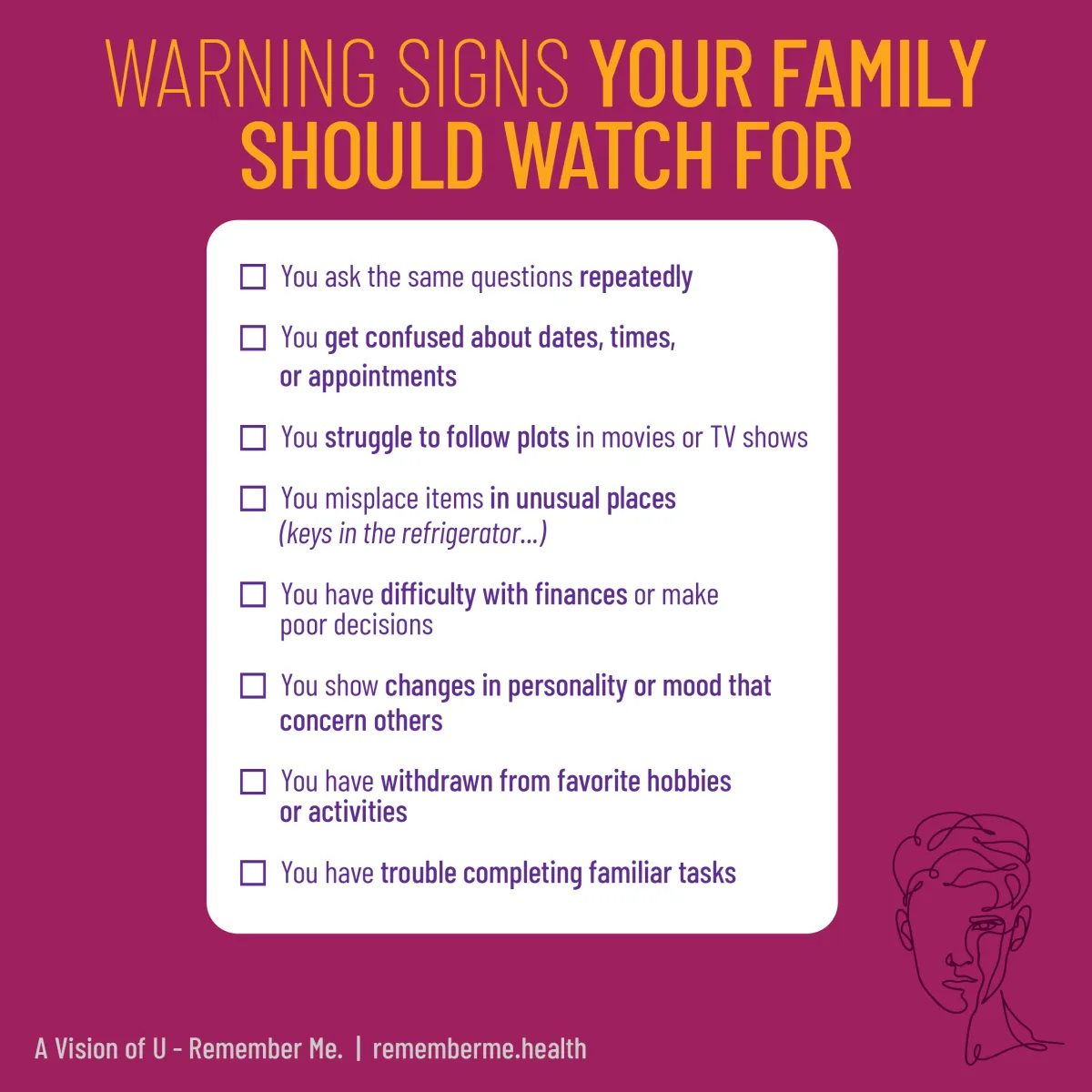
RESOURCES
Truth-telling resources designed to provoke, challenge, and inspire action.

CHECKLISTS
Quick Self-Assessment Tools
Evaluate your cognitive health status with these straightforward assessment tools. The results might reveal patterns you've been ignoring or concerns you need to address. Awareness precedes action.

warning signs your family should watch for
☐You ask the same questions repeatedly
☐ You get confused about dates, times, or appointments
☐ You struggle to follow plots in movies or TV shows
☐ You misplace items in unusual places (keys in the refrigerator, etc.)
☐ You have difficulty managing finances or making poor money decisions
☐ You show changes in personality or mood that concern others
☐ You withdraw from favorite hobbies or activities
☐ You have trouble completing familiar tasks that were once routine
"Your family sees these warning signs but they're too scared to confront you. Here's what they're quietly noticing."
The people closest to you see changes you can't or won't acknowledge. They watch you struggle with things that used to be easy, notice your confusion, observe your personality shifts. But they don't know how to bring it up without hurting you. Meanwhile, you're missing critical warning signs that outside observers can see clearly.
Ask someone who knows you well: "Have you noticed changes in me lately?" Their honest answer might save your cognitive future.

warning signs your ignoring
☐ Avoid social situations because you feel "slower"
☐ Take longer to make simple decisions that used to be automatic
☐ Feel overwhelmed by tasks that never bothered you before
☐ Forget conversations you had yesterday but remember details from 20 years ago
☐ Get lost or confused in familiar places you've been hundreds of times
☐ Struggle to find words mid-sentence and laugh it off
☐ Repeat questions because you forgot you already asked them
"These aren't just 'senior moments' - they're emergency warning signs you're dismissing as normal aging."
Warning signs are called that because they demand immediate attention. But you're explaining away every red flag instead of investigating what's actually happening. Each checked item represents your brain asking for help. Don’t make jokes and excuses. This isn't normal aging - it's cognitive decline you're too scared or proud to address.
How many red flags are you currently explaining away? Stop making excuses and start getting answers.

brain health myths you probably believe
☐ "Memory loss is just a normal part of aging"
☐ "There's nothing you can do about cognitive decline"
☐ "Smart people don't get dementia"
☐ "Brain training games prevent Alzheimer's"
☐ "If it runs in your family, you'll definitely get it"
☐ "Supplements can replace healthy lifestyle choices"
☐ "You only use 10% of your brain anyway"
☐ "Cognitive problems only affect elderly people"
"Every myth you believe keeps you from taking action that could save your brain. How many of these lies are you living by?"
These aren't harmless misconceptions - they're dangerous beliefs that prevent early intervention and lifestyle changes. Each checked myth represents a barrier to cognitive recovery you've built in your own mind. You're not just misinformed, you're actively sabotaging your brain health with false beliefs disguised as wisdom.
Which myth has prevented you from taking your cognitive health seriously? Time to replace dangerous beliefs with life-saving truth.

mental shortcuts weakening your brain
☐ Use GPS for routes you've driven dozens of times
☐ Let autocorrect fix your spelling instead of learning proper spelling
☐ Use calculators for simple math your brain could easily handle
☐ Rely on your phone's contacts instead of memorizing important numbers
☐ Set digital reminders for everything instead of training your memory
☐ Choose entertainment over learning in all your free time
☐ Let others make decisions so you don't have to think
"You're outsourcing your brain function to technology and wondering why your mental abilities are declining."
Every cognitive shortcut trains your brain that thinking isn't necessary. You've systematically weakened your memory, navigation, calculation, and decision-making abilities by giving them to devices. Then you act surprised when these mental muscles atrophy from disuse. You created your own cognitive dependence and decline.
Which mental shortcut has made you most cognitively dependent? What would you have to actually think about if technology disappeared tomorrow?

digital habits weakening your brain
☐ Can't function without your smartphone for basic daily tasks
☐ Rely on autocorrect and spell-check instead of learning proper spelling
☐ Use voice-to-text because typing/writing feels "too slow"
☐ Let streaming services choose what to watch because deciding feels hard
☐ Use food delivery apps because planning meals requires too much thinking
☐ Depend on digital reminders for everything instead of training your memory
☐ Google answers immediately instead of trying to figure things out first
"You've outsourced so much brain function to technology that you're becoming cognitively helpless without devices."
Every digital dependency represents a mental muscle you've allowed to atrophy. You chose convenience over cognitive strength, automation over mental exercise. Now you can't spell, calculate, remember, navigate, or decide without technological assistance. You're not just tech-savvy - you're brain-lazy and digitally dependent.
How many tech dependencies are making your brain weaker? Share this with someone who remembers life before smartphones - they'll recognize your decline.

sleep sabotage behaviors
☐ Screen time within 2 hours of bedtime, stimulating your brain
☐ Drink caffeine after 2 PM and expect quality sleep anyway
☐ Eat large meals or snacks within 3 hours of sleeping
☐ Keep your bedroom too warm, disrupting deep sleep cycles
☐ Use your bed for work, TV, or phone time instead of just sleep
☐ Have an inconsistent sleep schedule that confuses your circadian rhythm
☐ Stay up late because you're "too wired" to sleep
☐ Wake up multiple times and check your phone
"Poor sleep prevents your brain from cleaning out toxic proteins that cause Alzheimer's. You're choosing brain damage over sleep hygiene."
During deep sleep, your brain's glymphatic system flushes out amyloid plaques and tau proteins. But every sleep-sabotaging behavior prevents this critical cleaning process. You're letting toxic proteins accumulate in your brain while prioritizing late-night entertainment over neural maintenance. Those proteins are building up while you scroll.
Which sleep-destroying habit is preventing your brain from cleaning itself? How much toxic protein buildup are you willing to accept?

early intervention opportunities
☐ Ignoring mild cognitive changes because they're "not that bad yet"
☐ Avoiding cognitive testing because you're afraid of the results
☐ Dismissing family concerns about your memory or thinking
☐ Waiting for symptoms to worsen before seeking professional help
☐ Procrastinating on lifestyle changes that could reverse early decline
☐ Making excuses instead of making appointments for cognitive assessment
☐ Believing "it's too late" to make meaningful improvements
"Early intervention is your best chance for cognitive recovery. Every checked box is a missed opportunity you can't get back."
The window for effective intervention gets smaller every day you wait. Mild cognitive impairment is reversible, but you're treating it like it doesn't matter until it becomes severe. You're wasting the precious time when your brain can still recover, rebuild, and strengthen. Early action saves brains - denial destroys them.
How many recovery opportunities are you currently wasting?

signs your brain's executive function is failing
☐ Struggle to prioritize tasks and everything feels equally urgent
☐ Start multiple projects but rarely finish anything completely
☐ Procrastinate on important decisions until they become crises
☐ Feel overwhelmed by simple planning and organizational tasks
☐ Have difficulty switching between different types of activities
☐ Forget what you were doing mid-task and lose your train of thought
☐ Avoid complex thinking tasks because they feel "too hard"
"Executive function is your brain's management system. Yours is clearly failing and you're pretending it's just being 'scattered.'"
These aren't personality quirks - they're signs of executive dysfunction. Your brain's CEO is failing to manage basic cognitive operations like planning, prioritizing, and task switching. You're not just disorganized, you're experiencing cognitive control breakdown. Every checked symptom represents diminished mental management capacity.
How many executive function failures do you recognize? What happens to a company when the CEO stops functioning effectively?

memory system breakdown
☐ Forget people's names immediately after being introduced
☐ Can't remember what you had for breakfast
☐ Lose track of conversations while they're happening
☐ Forget why you walked into a room multiple times daily
☐ Can't recall movies you watched last week?
☐ Need to write everything down or you'll forget it
☐ Forget appointments despite putting them in your calendar
☐ Remember events from 20 years ago but not yesterday
"Your memory system isn't just 'getting older' - it's systematically breaking down while you make excuses."
Memory formation, storage, and retrieval are failing at multiple points. You're not experiencing normal aging - you're watching your memory systems collapse in real time. Every forgotten name, lost conversation, and missing appointment is evidence of neural network breakdown. Stop calling it cute names and face the systematic failure.
How many memory failures did you experience today? When will you stop calling it normal and start calling it an emergency?









This program is designed to complement medical care and is based on lifestyle interventions supported by current research. While 92% wait for pharmaceutical solutions, this course provides evidence-based tools you can use immediately. The information provided is not intended to diagnose, treat, cure or prevent any disease. Results may vary.
Privacy Policy | Terms & Conditions | © 2025 AVOU&Me LLC